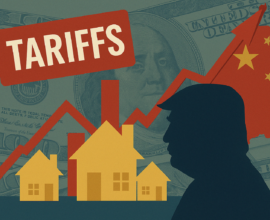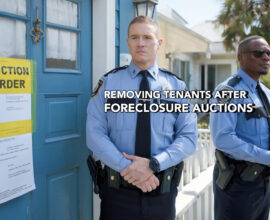How Liens Work & How To Profit with Them
Buying foreclosed property with lots of encumbrances is not for the fainthearted. Some of us here in the twilight world of purchasing real estate from a Florida county foreclosure auction seek out properties that have heaps of encumbrances, some seemingly immovable. But are they really? How liens work is an important subject every serious investor needs to understand.
Updated 10-03-2021
IRS Tax Liens
IRS liens are perhaps the most misunderstood lien encumbrance. Most believe that buying a foreclosure property with IRS liens is akin to swimming with sharks in the ocean — you are asking to get bitten. This scenario is widely considered a no no, BUT let’s take a closer look and reveal the truth.
If the IRS tax lien is before the mortgage being foreclosed, it will not be foreclosed through the mortgage foreclosure sale. Although you bought the property at a county auction, selling afterward will be impossible because you will not get title insurance. The amount of the lien must be paid in full before it will be released.
Be Prepared for Tricky Situations
You’ll encounter a couple of curveballs. First, there is a statute of limitations of 10 years on a tax lien. In Florida, the state must stop trying to collect on a past debt after it has elapsed. Instead of running away the minute you see an IRS lien, take a look to see if it has expired or there are only six months to a year left, which you can build into your calculations.
The second curveball situation is one I have dealt with several times now. Some of my peers have even made a career out of this sticky situation! After you buy the property at auction, apply to the Internal Revenue Service (IRS) for a Form 14135, which is an Application for Certificate of Discharge of Property from Federal Tax Lien.
It is better if the individual with the IRS tax liens attached to their name did not live at the property you bought. You will argue that this property was just another asset of the debtor. Check the Notice of Federal Tax Lien (Form 668 [y] & [c]), which can be viewed at local county records, to see what the delinquent taxpayer has listed as their residence.
If the foreclosed property is the registered address, it’s not the end of the world. It will just make the journey a little harder.
In layman’s terms, by using these forms, you are telling the IRS: “I bought this property at a county foreclosure auction for a lot less than what is owed on the federal tax lien. The after repair value (ARV) of the house will be a lot less than the federal tax liens. You could never recover all the debt owed to you from the sale of this property. Please release these liens so I can sell the property I now own, as the tax owed to the IRS has nothing to do with me.”
Make sure that the maximum bid of the real estate you are trying to win at the county foreclosure auction is much less than the value of the tax liens, and the same will apply after it is repaired.
Bearing all the above in mind, do the math and carefully choose a property to bid on at the county foreclosure auction.
IRS tax liens cover every amount imaginable. Let’s say an individual racked up a tax bill of $1,500,000 on the house you bought at the county foreclosure auction for $400,000. Even if the house is worth $500,000 in the same condition on the open market, there is no way the IRS will ever recover any of their debt from the sale of this property you successfully bid on and won at the county foreclosure auction.
You will have to prove this. The documentation that the IRS requires is tricky but definitely manageable and certainly worthwhile if you bought a house at the county foreclosure auction for a great price.
The IRS Could — But Likely Won’t — Redeem Your Property
Remember that the IRS always has the option to redeem the property from you within 120 days at the price you paid at the county auction, plus all your expenses.
I don’t actually know of anyone who has experienced this. To my knowledge, the IRS has never bid at a county foreclosure auction on a property with their lien so that they could resell the property to cover all or part of their debt. If you’ve heard of such an event, please leave details below in the comment box.
Additionally, the IRS will only consider foreclosing themselves if there is enough equity in the property to pay off ALL superior liens AND COVER the IRS debt. In the example I describe above, there is not, which is the key to whether you bid.
If the IRS tax lien is junior to the mortgage that is being foreclosed on, that means the mortgage foreclosing was registered at the county records before the IRS tax lien. The IRS tax lien will be foreclosed through the foreclosure sale at the same time as the mortgage foreclosure. Any of their liens over the property are extinguished after the certificate of title is issued.
Even in this situation, the IRS will have a redemption period of 120 days after the foreclosure under the same terms as previously mentioned.
How One PropertyOnion.com Member Profited from a Property With IRS Liens
Below is a funky set of circumstances that I witnessed in December 2019 from an investor and member in Aventura, Florida.
(All numbers rounded up)
• Won a 3 X Bed, 2 X Bath, 2,300 SF – SFH, HOA Property at County Foreclosure Auction $2,300
• Negotiated & Cleared 1st & 2nd Mortgages (Two Separate Banks) $89,000
• Cleared Minor Liens, Mostly Mechanics & Water Utility $1,350
• Cleared Delinquent Property Taxes $7,230
• Observed & Ignored Two 12-Year-Old Tax Liens ($56,000)
• Applied Successfully to The IRS [Form 14135] to Remove Three Tax Liens ($680,000)
• Gut Job Renovation $70,000
• Holding Costs 18 Months, HOA, Property Taxes & Utilities $9,200
• Total Cost Including Holding $179,080
• Sold $480,000
___________________
• Profit $300,920
Zackery used PropertyOnion.com search to find the property, PropertyOnion.com to research the property, Propertyonion.com to get the Title Search Report, to then study his options and then use his 15 years of knowledge and experience to be able to pull off a complicated deal like this.
Zach, told me, “not one person bid against me”, he just paid the plaintiff’s opening bid, this was because most people run from messy liens. But if you want to make real money in this business, learn to love them, embrace them, and use them to your advantage.
Zack set the Gold Standard in our business, and it is a privilege to have him as a member, mentor & friend.
Finally, fighting these types of liens can be a precarious business if you do not know what you are doing. If you are not that confident, please don’t take a risk, contact a specialist property attorney, such as Jeffrey Harrington of Harrington Legal Alliance.
Mechanics Liens
I love mechanics liens, primarily because the vast majority that you find attached to a piece of real estate are usually put there by (but not always) small- to medium-size corporations or one-man-band contractors. You can negotiate with these types of entities more easily than a large conglomerate.
To understand how to get out of them, you have to understand what a mechanics lien is and why it is deployed.
A mechanics lien is usually recorded at the county by a contractor, subcontractor, or supplier of materials when they haven’t received payment for improvements they made to a property.
It’s not always the homeowner who has created the debt! Sometimes a contractor used by the homeowner didn’t pay one or more of their subcontractors, even though the homeowner already paid the contractor. The homeowner, who was already in a precarious financial position, is now in an even worse situation.
Why do we have to bother with mechanics liens if they are subordinate to a mortgage? Perhaps the property is in a tax deed sale and the liens will be wiped out in the foreclosure process.
Let’s take Zack’s example and apply a similar type of situation. An HOA lien is subordinate to a mechanics lien, but all encumbrances are subordinate to the mortgage lien.
Zack’s play was to take out the HOA lien first as this is the first of the encumbrances to a foreclosure sale, negotiating with the bank to settle their mortgage.
At this point, the mechanics liens are at full value. Before the auction, it is essential that you approach the mechanics lien holder to negotiate a reduced amount to satisfy their liens. You will explain that their liens will be wiped out in the mortgage foreclosure if they don’t make a deal with you.
You won’t have to negotiate with a mechanics lien holder very often. On the odd occasion that I have been involved in such a situation, I managed to negotiate these mechanics liens down to ten cents on the dollar.The fact of the matter is, without you, they’re going to get zilch. If the contractor gains knowledge of your game plan, they may become uncompromising, so this is the only time you will be able to negotiate with strength!
Mortgages
With first mortgages, there isn’t an effective way of negotiating a reduced payment to get it wiped off altogether. I make mention of the first mortgage only if you are bidding on a second or third mortgage foreclosure, or an HOA or rare mechanics foreclosure. Never forget there is always a chance that the first mortgage has been paid down significantly enough for a deal to poke its head out of the ground at you.
If you like a property but the deal’s numbers make no sense because of a second or third mortgage, don’t stop there. Check all the other mortgages besides the plaintiff’s to estimate the payoff on each. If the plaintiff listed in the foreclosure auction is anything other than a bank, check the other mortgages for a payoff amount.
You can estimate mortgage balances quickly by getting our amortization calculator, available in REI Tools for you to download. To start, put in the origination date of the mortgage (easily found on public records) and the assumed date of when they stopped making payments; usually, this is three months before any lis pendens recorded on public records. Next, apply an assumed interest rate of 5%. By doing this, you can roughly calculate the mortgage payoff.
If you take the time to read the entire mortgage, many have the borrower’s payment table in the public documents or at least show the interest rate. Having the actual interest rate will make your efforts at figuring out balances with an amortization calculator much more accurate.
There are also some weird and wacky ways to end up with a property free and clear of a mortgage — assuming it had one to begin with — from a county foreclosure auction.
The statute of limitations for a mortgage holder to foreclose on a property in Florida is five years from the recording of a lien. Some attorneys argue that the time period for the statute of limitations to begin is from the date of default, but this is one for a smart property attorney to look at on your behalf. It does happen, but it’s infrequent. I have never been the recipient of such good fortune, although we live in hope! Believe it or not, I always check this out when I look at foreclosure properties.
Municipal Liens
Municipal liens are like nettles; they are on most neglected properties and can hurt you, but they can be cut down and rendered harmless.
Municipal liens are attached to real estate for many reasons. The most common is neglect, which is reasonably apparent if somebody is facing foreclosure. It can be for something as small as a vehicle parked on the grass, trash being left out and not put away in an appropriately designated area, broken windows, or tall grass.
The fact is these liens are about the local municipality trying to keep their locality up to scratch. Getting these liens removed or even reduced is easily achievable if you go about it in the right way.
On occasion, it’s best to use an attorney to negotiate these liens as detailed by real estate attorney Jeffrey Harrington in “Removing a Lien after Buying at County Auction” which we highly recommend companion reading to this article.
I’m sure you have all seen municipal liens with a ridiculous daily or weekly fine. These amounts and accruing penalties are placed on the property to get the owner to take action quickly.
Bring Out Your Inner Extrovert and Make Friends at the Municipal Office
This is one of the few occasions when you need to be on your best behavior and find the right person in the municipal office to make your new BFF. This is especially true if you buy county auction properties in the same location regularly.
Generally, the people who work in these municipal offices are sensible (there are exceptions to every rule, of course). Their primary goal is to keep the community looking beautiful.
If you can show that, as the incoming owner, you are going to bring the property back to code and make improvements, nine times out of ten you will be able to make a deal. I have seen $800,000 liens negotiated down to $5,000. $700,000 become $10,000, $5,000 become $0, and so on.
Take a trip to the local municipal office before the county foreclosure auction. Find someone you can get on with, tell them that you are thinking of bidding on a neglected property in their area, and explain what your plans are if you win.
Ask whether they could help you by removing (don’t use the word reduce — start with the ultimate goal first, and then talk about reduction) the municipal liens.
They are never going to give you a cast-iron guarantee on the spot. Still, both history and my experience have shown that these liens can be significantly reduced once you start taking action and the municipal office sees that you are going to do as you say.
Please understand that I am not saying these municipal liens will disappear completely. Providing you behave in a civil, friendly, and professional manner, you can expect these liens to drop to around or below 5% of their original value once you have talked sincerely to the municipal office.
Another gem I have learned from investors: Don’t tell the municipality one thing and do another. Keep your word. Otherwise, you will be eating a whole load of fines that will be difficult to get reduced or removed.
Once you have completed the fixes that bring your property up to code as you promised, your life will become much easier when it comes to future properties in the same municipality. You are establishing a reputation for being a responsible property owner and developer. The city will know your track record when it comes time to negotiate future liens.
One thing to remember is that utility liens like sewage and water, which are typically put into the same category as municipal liens, are rarely negotiable.
Homeowners Association (HOA) Liens and Condominium Building Association (Condo Liens)
I am not going to lie to you; these are the most difficult liens to get wiped out or removed from a county foreclosure auction.
HOA and condo liens come about when a home or condominium owner fails to pay their monthly association fees or special assessments. With penalties, interest, and attorney’s fees, the amount now owed does not resemble the original debt.
Member’s Only: Download “HOA Foreclosure Play E-Book” for detailed steps!
Homeowners start to drown in the exponentially growing debt once a lien has been issued, which is usually followed by an updated lien within six months. For this reason, some people just throw their hands up in the air and give up. There is no negotiating with HOA and condo boards in most cases.
That is why there are many HOA and condo liens in foreclosure. In the right circumstances, I would like to buy them — you can find out why if you read my article HOA Foreclosure Play for Big Profits at the County Auction on PropertyOnion.com.
There aren’t many plays as an investor buying at the county foreclosure auction for removing or reducing these liens; they are among the few liens that survive a mortgage foreclosure.
Removing an HOA Lien — My Single Success Story
I have once in my career managed to remove an HOA lien and ultimately defend my position with the plaintiff’s attorneys. I’ll tell you how, just for giggles.
In September 2016, I was contemplating buying a large estate home in the Palm Beach county foreclosure auction. As always, I was looking for angles to make it a great deal. Part of my due diligence, even today, is to look at the county records to see how old the last update of the condominium declaration and bylaws is.
By chance — if not providence — the last time the bylaws were updated on this particular property was some 15 years prior.
This was and still is very unusual; HOAs and condo associations continually update their bylaws. I decided to go into the public records and take a look at their bylaws. There’s a section in the bylaws that is usually named something like “Covenant for Maintenance of Assessments.” Buried in the middle of this section is a paragraph that covers what happens to delinquent maintenance assessments once the property is sold.
The paragraph read like magic, and I quote, “The personal obligation for delinquent assessments shall not pass to his successors in title unless expressly assumed by them.”
Notice how this old, untouched bylaw is written in the masculine, probably by some old male chauvinist attorney who did not realize what a disservice he was doing to his client. Serves them right!
Considering the debt was approaching some $70,000, this information ended up making me a very happy camper, not to mention giving me a healthy payday.
After I won the property at the county foreclosure auction, I waited several weeks for the expected letter from the HOA’s attorneys. I promptly referred them to their bylaw, which they quickly discounted, quoting some other legal precedent that made this bylaw null and void.
My attorney directed them to the Florida District Court of Appeal that had upheld a judgment in a similar case in May 2015, when an HOA appealed a case they lost.
Apart from this rare circumstance, the only other occasion that an HOA or condo lien is wiped out is at a tax deed sale. There are no exceptions in this regard; private liens get wiped while state and federal liens remain. HOA and condo liens are rarely wiped out during or after a county foreclosure auction, so please account for these lien amounts and the run-ons (the amounts owed after the lien is recorded) in your calculations.
Messy Liens Can Be the Key to Big Profits
You can see why I and other experienced county foreclosure auction investors love messy liens — the messier they are, the better the deal gets in many cases. They thin out the herd of competitors at the county foreclosure auctions as well; the uninformed will take a look at municipal liens, perhaps tethered to an IRS tax lien and some mechanics liens, and run a mile.
But sitting down, looking at exactly what you have, and working out whether you can resolve these encumbrances to your advantage can bring you a nice windfall. Your acquired knowledge of how to remove IRS tax liens, mechanics liens, municipal liens, mortgage liens, and HOA liens will be worth it. Don’t let deals zip past you because they seem “too messy.” Roll up your sleeves and profit!









Excellent Article!!!
Thank you, I try my best 🙂
Yes, that was a very informative article.
Thanks for that info.
This relates to a question I have. I have seen many foreclosure auctions end with bids far below the final judgement amount. Some were won by the Plaintiff, which makes sense.
The question is what happens with the ones won by a 3rd party that were far below the final judgement amount? Most of those judgements were from mortgages, so did the bidder somehow negotiate those mortgages down?
Well, this is the beauty of the foreclosure auctions; the bank/lender was prepared to let the property go for below the final judgment amount. BUT you have to beware and make sure the plaintiff was not the second or third mortgage and that the first mortgage remains in play!
A bank/lender letting the property go for below the judgment amount is a regular occurrence, and it could mean that the property is so upside down financially or in such a state of disrepair that nobody is going to bid up to the judgment amount, so the bank/lender has taken a view.
The buyer has won the auction, and there is no negotiating with the bank/lender after this.
The County Foreclosure Business is a numbers game, and if you look close enough, you will always find an extreme bargain at every sale.
Hello,
Great Article! Can you please elaborate on making sure the plaintiff was not the second or third mortgage and that the first mortgage remains in play??
Thanks
The simplest way is to look at the title report you bought from propertyonion.com to see that the First mortgage lien reference number , which would have been recorded at the county when the mortgage was obtained by the defendant, is notated on the judgment document of the property being foreclosed on.
Anything other would mean that you would have to check the second or third mortgage liens that would also be notated in the title report and match them to the judgment document on the property that is being foreclosed on.
This way, you can see which liens are still in play.
Remember that the first mortgage will take out the second and third mortgages if they exist.